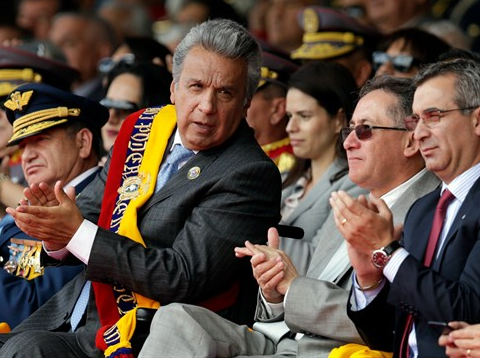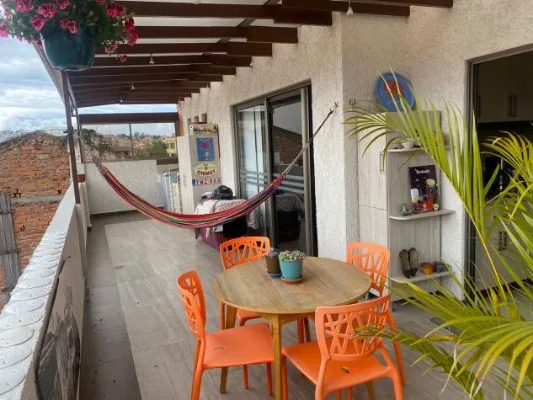Moreno has out-smarted Correa but bigger challenges lie ahead after referendum election
By Michael Shifter and Ben Raderstorf
South America’s biggest political surprise recently has come from one of its smallest countries, Ecuador, where President Lenin Moreno has maneuvered to break with his predecessor and a legacy tinged with authoritarianism and corruption.
authoritarianism and corruption.
Narrowly elected in April, Moreno had been vice president and the anointed successor of Rafael Correa, the populist, left-leaning, U.S.-trained economist who governed for a decade and centralized control over government, the economy and the media. Analysts speculated Moreno would be a timid caretaker put in place to allow Correa to sweep back into office in 2021 — in the mold of Dmitry Medvedev, who served as Russia’s president for a four-year period that was only a nominal pause in Vladimir Putin’s continued hold on power. Some even intimated that he was potentially a fall guy, propped up to either lose a difficult election or to govern through a period of economic downturn while Correa left the spotlight and went to live in Belgium.

Lenin Moreno has enjoyed high popularity ratings but will they last?
Instead, Moreno departed from the script. A quieter, more conciliatory figure than Correa—Moreno is the world’s only head of state in a wheelchair, having been paralyzed in a 1998 robbery attempt—his political maneuvering has been swift and decisive. He quickly turned on Correa, seeking to distance himself from perceived rampant corruption and an economic crisis. With a gentle tone, he has built new bridges with the opposition, the private sector and the press—all without alienating his base of working-class voters who benefited from Correa’s self-proclaimed “Citizens’ Revolution.” And with a high stakes referendum over term limits set for Feb. 4, Moreno has boldly moved to consolidate his gains and lock Correa out of office forever.
The first move on Moreno’s chessboard came barely two months after taking office. Last August, he stripped the vice president, Jorge Glas, who had been in the position since 2013 and is a close ally of Correa, of all responsibilities, stopping just short of firing him. Glas was accused of taking $13.5 million dollars in bribes from the Brazilian construction giant Odebrecht as part of the sprawling scandal involving kickbacks across Latin America. He has since been convicted, sentenced to six years in prison and removed from office.
The Glas case made it clear that Moreno intended to follow his own course, setting up a series of rifts within his political party, Alianza PAIS, which had been held together by its allegiance to Correa and controls a majority of seats in the National Assembly. Moreno has continued to methodically steer the government back toward the center. He criticized the “worrying” human rights and security situation in Venezuela, a close ally of Ecuador, and signaled changes in the relationships with Cuba and the United States. He eased banking regulations and took small steps toward cutting public sector salaries and other austerity measures. He opened an audit of public debt incurred under Correa, who views the move as “persecution.” Moreno even agreed to introduce reforms to Correa’s controversial Communications Act, which has been criticized around the world as a way to stifle dissent and a free press.
In his chess match with Correa, Moreno’s referendum may be checkmate. Among other questions, the referendum seeks to bar anyone convicted of corruption from public office, restructure an independent branch of government responsible for the appointment of many public officials and ban indefinite re-election, which the National Assembly voted to allow in a constitutional amendment a little more than two years ago. Re-imposing term limits is widely interpreted as an attempt to prevent Correa from returning to office.
Correa, for his part, seems to have been caught off guard. With impassioned, angry tweets and public statements, he has accused Moreno of “counterrevolution,” calling him a liar, traitor and imposter. On Jan. 5, he returned to Ecuador to personally direct the campaign against the referendum, calling it a “coup d’état.”
For now, Moreno is riding high. His unexpected course seems to have pleased voters across the ideological spectrum. According to a December poll, his approval rating has climbed steadily and is now just shy of 75 percent, the highest in Latin America today. By contrast, the presidents of Peru, Colombia and Brazil stand at 20 percent, 14 percent and just 6 percent, respectively. In another poll, 64 percent of Ecuadorians said they think Correa’s return is bad for the country. And 56 percent say they plan to vote “yes” on the question of banning indefinite re-election; 29 percent plan to vote “no.” Barring a major shift, Moreno should sail to an easy victory next month.
In something of a twist given the current political climate in the Americas, Moreno’s success is partially based on his establishment credentials. His center-left credibility allowed him to tack away from Correa’s authoritarian tendencies without alienating the ideological supporters of his predecessor’s “21st Century Socialism.” If Moreno were an outsider, or if the center-right candidate won last April, it is unlikely that reform efforts could have built such a broad base of support.
What remains uncertain, however, is how long Moreno’s balancing act between Correa’s friends and enemies can last. The political reform project is fragile, and a new scandal, natural disaster or unexpected turn of political events could stall his momentum. Moreno’s political changes are also mostly superficial. Despite the public clashes with Correa and marginal efforts to reform Ecuador’s governing institutions, the bulk of governmental, judicial, congressional and party officials remain unchanged. Moreno will also eventually have to define himself in ways other than in contrast to Correa. If the referendum passes in February, he must turn to the more difficult tasks of long-term governance.
Most importantly, Ecuador’s oil-driven economy only grew 1.5 percent in 2017—albeit after a recession of 1.6 percent in 2016—and the government faces considerable fiscal and macroeconomic challenges in the years ahead. It is unclear how much of Moreno’s support is from his fight against corruption and indefinite re-election, or if many believe that his political success will bring new economic energy. At a certain point, difficult choices must be made between cutting popular social spending and letting the government’s ledgers continue to deteriorate. Moreno may have found an anti-corruption and anti-authoritarian platform that pleases all sides, but finding an economic agenda that is similarly unifying will be more difficult.
Inevitably, either through missteps or simply the march of time, the laws of political gravity will apply to Moreno, too. It will be very tough for him to sustain these levels of support, which may only be a honeymoon phase. But, at least for now, Moreno’s strategy seems to be going exactly according to plan.
_________________
Michael Shifter is president of the Inter-American Dialogue. Ben Raderstorf is a program associate in the Dialogue’s Peter D. Bell Rule of Law Program.


















